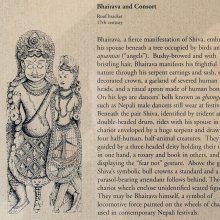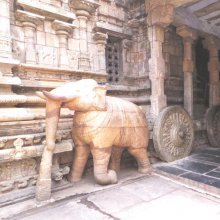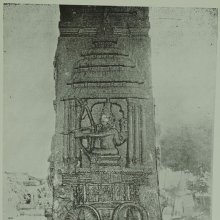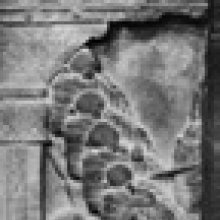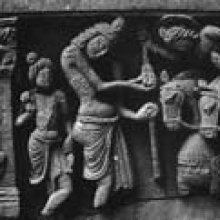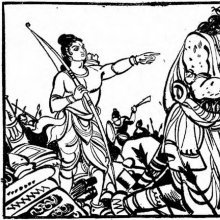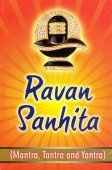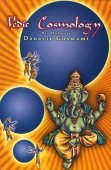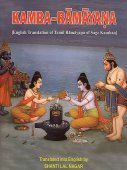Chariot: 2 definitions
Introduction:
Chariot means something in Hinduism, Sanskrit. If you want to know the exact meaning, history, etymology or English translation of this term then check out the descriptions on this page. Add your comment or reference to a book if you want to contribute to this summary article.
Images (photo gallery)
(+66 more images available)
In Hinduism
Shaktism (Shakta philosophy)
Source: Brill: Śaivism and the Tantric Traditions (shaktism)Chariots are involved in the worship of the Goddess, and formed a part of the Navarātra Tantric ritual (an autumnal festival of the warrior goddess Caṇḍikā).—Nine wooden shrines to be built on the Eighth lunar day (mahāṣṭamī), and the goddess is to be installed in a gold or silver image, in a sword or in a trident; worship involves chariot and palanquin processions.—Various 8th century sources refer to such rituals involving chariots, for example: Devīpurāṇa, Kālikāpurāṇa, Kṛtyakalpataru, Durgābhaktitaraṅgiṇī, Durgāpūjātattva, Durgāpūjāviveka, Bhadrakālīmantravidhiprakaraṇa in Sanderson (2007); account of the Durgā Pūjā in Kelomal, West Bengal (Nicholas 2013).

Shakta (शाक्त, śākta) or Shaktism (śāktism) represents a tradition of Hinduism where the Goddess (Devi) is revered and worshipped. Shakta literature includes a range of scriptures, including various Agamas and Tantras, although its roots may be traced back to the Vedas.
Purana and Itihasa (epic history)
Source: archive.org: Shiva Purana - English TranslationChariots are denoted by the Sanskrit term Ratha, whereas the Divine Chariot of lord Śiva is denoted by the Sanskrit term Divya-Ratha, which was built by Viśvakarman and contains everything found in the world (brahmāṇḍa), according to the Śivapurāṇa 2.5.8 (“The detailed description of the chariot etc.”).—Accordingly, as Sanatkumāra narrated to Vyāsa: “The divine chariot (divya-ratha) of lord Śiva consisting of all the worlds was built by Viśvakarman with devoted effort. It was appreciated by all. [...] Everything in the world found a place in the chariot”.

The Purana (पुराण, purāṇas) refers to Sanskrit literature preserving ancient India’s vast cultural history, including historical legends, religious ceremonies, various arts and sciences. The eighteen mahapuranas total over 400,000 shlokas (metrical couplets) and date to at least several centuries BCE.
See also (Relevant definitions)
Ends with: Divine chariot.
Full-text (+1623): Ratha, Rathin, Syandana, Akshauhini, Saratha, Rathya, Dvairatha, Rathanika, Rathika, Vimana, Rathacarana, Caturanga, Patti, Pushpaka, Yana, Rathakara, Rathayuddha, Dasharatha, Nicakraya, Ratharathi.
Relevant text
Search found 277 books and stories containing Chariot; (plurals include: Chariots). You can also click to the full overview containing English textual excerpts. Below are direct links for the most relevant articles:
Kautilya Arthashastra (by R. Shamasastry)
Chapter 33 - Chariots, Infantry and the Duties of the Commander-in-Chief < [Book 2 - The duties of Government Superintendents]
Chapter 5 - The Distinctive Array of Troops < [Book 10 - Relating to War]
Chapter 4 - Buildings within the Fort < [Book 2 - The duties of Government Superintendents]
The Chariots Of Navgrahas < [Astrology In Garuda Purana]
The Skanda Purana (by G. V. Tagare)
Chapter 35 - The Procedure of Preserving the Chariot < [Section 2 - Puruṣottama-kṣetra-māhātmya]
Chapter 25 - The Construction and Installation of the Chariot of the Lord < [Section 2 - Puruṣottama-kṣetra-māhātmya]
Chapter 19 - The Battle between Viṣṇu and Kālanemi < [Section 2 - Kaumārikā-khaṇḍa]
Manasara (English translation) (by Prasanna Kumar Acharya)
Chapter 43 - The cars and chariots (ratha-lakṣaṇa)
Chapter 1 - The Contents (saṃgraha)
Chapter 3 - The classification of Architecture (vāstu-prakaraṇa)
Puranic encyclopaedia (by Vettam Mani)
Warfare and Military System in Vedic Literature (by Rinki Deka)
Composition of Army < [Chapter 2 - Military System as Revealed in the Vedic Texts]
Principles of War Ethics < [Chapter 4 - Principles and Ethics related to the Warfare]
Related products
